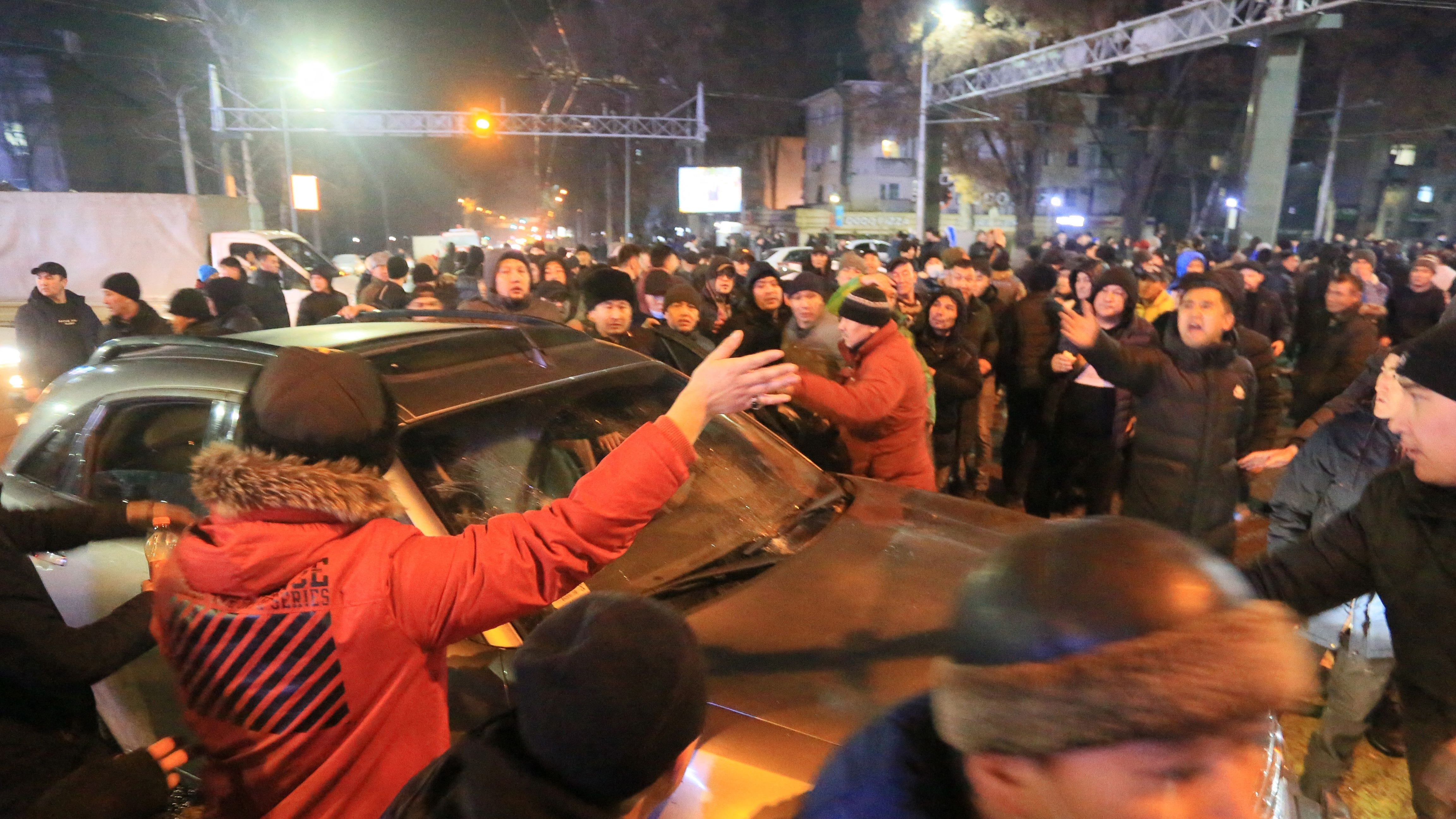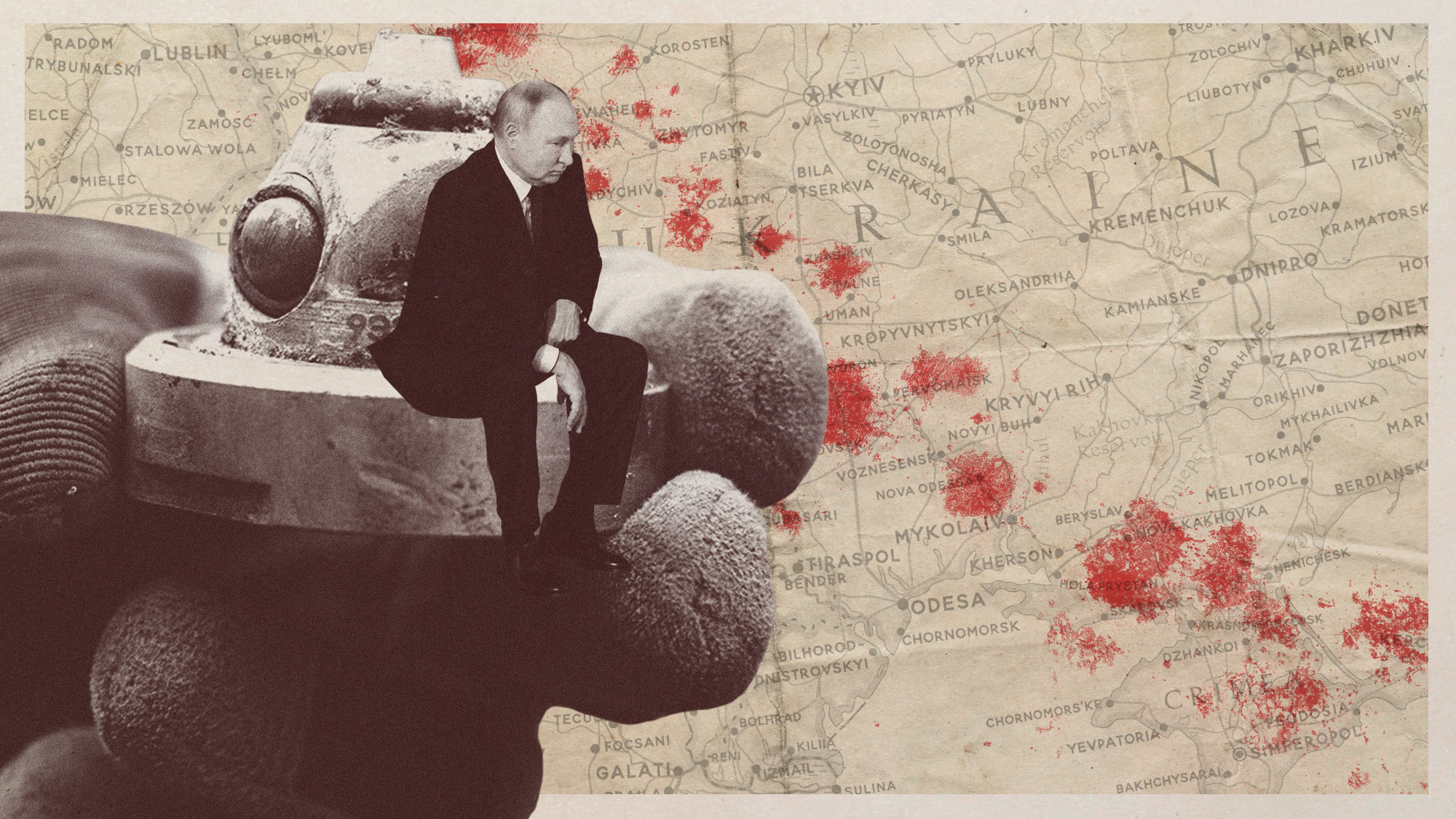Everything we know so far about Kazakhstan’s state of emergency
Government forced to resign amid protests over fuel prices

A free daily email with the biggest news stories of the day – and the best features from TheWeek.com
You are now subscribed
Your newsletter sign-up was successful
Kazakhstan’s president has accepted the resignation of the country’s cabinet just hours after declaring a state of emergency following the outbreak of widespread protests.
The “unprecedented unrest across the nation” was triggered by “an energy price hike”, The Moscow Times reported. “More than 200 people were detained” after “thousands took to the streets in the largest city Almaty and in the western province of Mangystau”.
Video footage of the protests in Almaty “showed lines of riot police and numerous crowd control vehicles massed in the centre of the city”, said The Guardian. Security forces deployed “stun grenades and tear gas after crowds refused to disperse”, the paper continued, and “there were unverified reports of police cars on fire” as protestors braved “subzero temperatures”.
The Week
Escape your echo chamber. Get the facts behind the news, plus analysis from multiple perspectives.

Sign up for The Week's Free Newsletters
From our morning news briefing to a weekly Good News Newsletter, get the best of The Week delivered directly to your inbox.
From our morning news briefing to a weekly Good News Newsletter, get the best of The Week delivered directly to your inbox.
‘Energy hike’
As the violence escalated, the government of the “oil rich country” last night promised to reintroduce “some price caps on liquefied petroleum gas (LPG)”, Reuters said. The pledge follows “a sharp rise in the price of the fuel” after the authorities lifted the cap on 1 January.
“Many Kazakhs have converted their cars to run on LPGs, which is far cheaper than gasoline as a vehicle fuel in Kazakhstan because of price caps,” the news agency continued.
The government had argued that the low price was unsustainable, but unrest involving thousands of people erupted in the southwestern town of Zhanaozen just one day after the cap was lifted. The area is “an oil hub” and was the “site of deadly clashes between protesters and police a decade ago” in which at least 16 people were killed.
The latest demonstrations quickly spread to other parts of surrounding Mangystau province and western Kazakhstan, including a worker camp used by sub-contractors of Kazakhstan’s biggest oil producer, Tengizchevroil.
A free daily email with the biggest news stories of the day – and the best features from TheWeek.com
The Chevron-led oil venture said that “output had not been affected” by the protests.
In Almaty, “police appeared to have taken control of the main square shortly after deploying flashbang grenades”, Reuters reported. However, periodic “explosions were heard for hours on nearby streets and in other parts of the city”.
According to the country’s interior ministry, more than 200 people were detained nationwide after “groups of citizens blocked roads and blocked traffic, disrupting public order”. At least 95 police officers were also injured in the demonstrations, the department said in a statement.
“Mobile internet was down and messaging apps were blocked across large parts of the authoritarian Central Asian nation” in response to the unrest, The Guardian reported. A two-week state of emergency covering Almaty and Mangystau province was also declared early on Wednesday.
The measures imposed by the government include an 11pm to 7am curfew, movement restrictions and a ban on mass gatherings.
President Qasym-Jomart Tokayev tweeted yesterday that the protests were led by “destructive individuals who want to undermine the stability and unity of our society”. In a video address, he added: “Calls to storm or attack government buildings are absolutely illegal.”
Cabinet sackings
Despite his bullish public statements, Tokayev “moved with speed after the unrest”, quickly “accepting the resignation of the cabinet headed by Prime Minister Askar Mamin”, said The Moscow Times.
The cabinet stepped down after demonstrators in Almaty were heard chanting “old man out” – “a reference to Tokayev’s still-powerful predecessor and mentor Nursultan Nazarbayev”, according to the paper – and “government resign”.
The Guardian said that Tokayev was the “hand-picked successor” to Nazarbayev, “a Soviet-era Communist boss who became Kazakhstan’s first leader after independence and ruled for nearly three decades until he stepped down in 2019”.
Under Nazarbayev’s rule, “a small elite amassed enormous wealth”, and he is widely considered to “wield enormous power behind the scenes”, the paper added. By contrast, “life for many ordinary Kazakhs is still hard-going, particularly in the resource-rich west of the country”.
Nazarbayev is also a close ally of Russian President Vladimir Putin. Kazakhstan remains “of crucial importance to Russia as an economic partner and home to a large ethnic Russian population”, said The Moscow Times.
Kazakhstan’s “authoritarian government tolerates little real opposition and has been accused of silencing independent voices and media”, the paper continued. Unsanctioned protest remains “illegal despite a 2020 law that passed easing some restrictions of freedom of assembly”.
President Tokayev yesterday pledged that the government would meet to discuss “the socio-economic demands” of protesters. The meeting was to be held today in the capital Nur-Sultan, which was renamed from Astana in 2019 in honour of Nazarbayev.
-
 The environmental cost of GLP-1s
The environmental cost of GLP-1sThe explainer Producing the drugs is a dirty process
-
 Greenland’s capital becomes ground zero for the country’s diplomatic straits
Greenland’s capital becomes ground zero for the country’s diplomatic straitsIN THE SPOTLIGHT A flurry of new consular activity in Nuuk shows how important Greenland has become to Europeans’ anxiety about American imperialism
-
 ‘This is something that happens all too often’
‘This is something that happens all too often’Instant Opinion Opinion, comment and editorials of the day
-
 New START: the final US-Russia nuclear treaty about to expire
New START: the final US-Russia nuclear treaty about to expireThe Explainer The last agreement between Washington and Moscow expires within weeks
-
 What would a UK deployment to Ukraine look like?
What would a UK deployment to Ukraine look like?Today's Big Question Security agreement commits British and French forces in event of ceasefire
-
 Trump peace deal: an offer Zelenskyy can’t refuse?
Trump peace deal: an offer Zelenskyy can’t refuse?Today’s Big Question ‘Unpalatable’ US plan may strengthen embattled Ukrainian president at home
-
 Vladimir Putin’s ‘nuclear tsunami’ missile
Vladimir Putin’s ‘nuclear tsunami’ missileThe Explainer Russian president has boasted that there is no way to intercept the new weapon
-
 How should Nato respond to Putin’s incursions?
How should Nato respond to Putin’s incursions?Today’s big question Russia has breached Nato airspace regularly this month, and nations are primed to respond
-
 Russia’s war games and the threat to Nato
Russia’s war games and the threat to NatoIn depth Incursion into Poland and Zapad 2025 exercises seen as a test for Europe
-
 What will bring Vladimir Putin to the negotiating table?
What will bring Vladimir Putin to the negotiating table?Today’s Big Question With diplomatic efforts stalling, the US and EU turn again to sanctions as Russian drone strikes on Poland risk dramatically escalating conflict
-
 Ottawa Treaty: why are Russia's neighbours leaving anti-landmine agreement?
Ottawa Treaty: why are Russia's neighbours leaving anti-landmine agreement?Today's Big Question Ukraine to follow Poland, Finland, Lithuania, Latvia and Estonia as Nato looks to build a new ‘Iron Curtain' of millions of landmines